It’s fair to say that most of us lose essential data in our computers either through accidental deletion, virus attacks, permanent removal of files, etc. at some point. Some of these files contain critical information that cannot be assumed and needs recovery. In this post, we will discuss some of the best data recovery available for Linux systems. The fantastic part is that most of them are opensource and freely available for use.
What is Data Recovery?
The process of Data recovery is the retrieving of either lost, damaged, inaccessible, or corrupted data from storage devices. They can range from storage media like Hard drives, SSD, USB drives, DVD/CD, and other electronic storage devices.
How is it possible to recover the data after deletion?
As strange it may sound, the data is not ‘actually’ deleted from the hard disk after you remove the file from your Linux system (or any OS if it matters) using the delete key. The operating system just marks the memory sector of the deleted file location as available space for the next write sequence. It means anyone can use a special tool to get access to that memory sector and recover the data before other data overwrites it. The special tool I’m talking about is the File Recovery tool.
Best File Recovery Tools For Linux
Currently, there are many Linux data recovery software in the market, giving users a large pool to choose the right one. In this article, we will focus on the six best recovery tools available for Linux, and also show you how to install them on the most common Linux distributions.
1. TestDisk
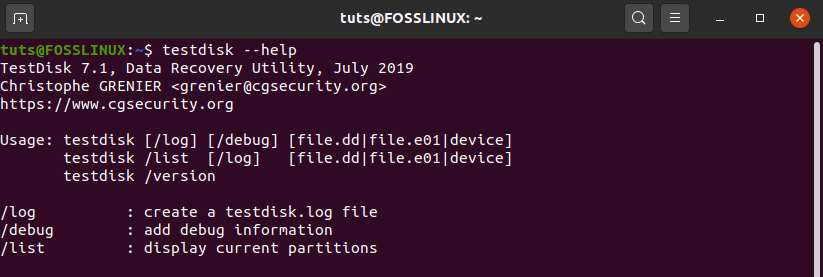
TestDIsk on Ubuntu
TestDisk is an opensource Data recovery tool mainly used to retrieve damaged partitions. It is also useful in recovering a non-booting disk if an error was caused by harmful software, virus, or even accidental file deletion. It is a powerful command-line utility that is easy to use and fast to understand.
Installation
Installing this highly reliable utility is fast and easy. You can download the TesDisk setup file from the link below or use the command-line to install it.
Install TestDisk on Ubuntu and Debian
sudo apt update sudo apt install testdisk
Install TestDisk on Red Hat and CentOS 7
yum install epel-release yum update yum install testdisk
Install TestDisk on Fedora
sudo dnf install tesdisk
Install TestDisk on Arch Linux
sudo pacman -S testdisk
Features
- TestDisk enables you to gather necessary information about a corrupted drive.
- Recover deleted partitions.
- It’s a cross-platform application that runs Linux, Windows Operating Systems, MacOS, and many more Operating System.
- TestDisk can be used to re-build broken partition tables.
- It is used to rewrite the corrupted MBR (Master Boot Record).
- It can be used to backup partitions EFI GPT partitions.
2. Ddrescue
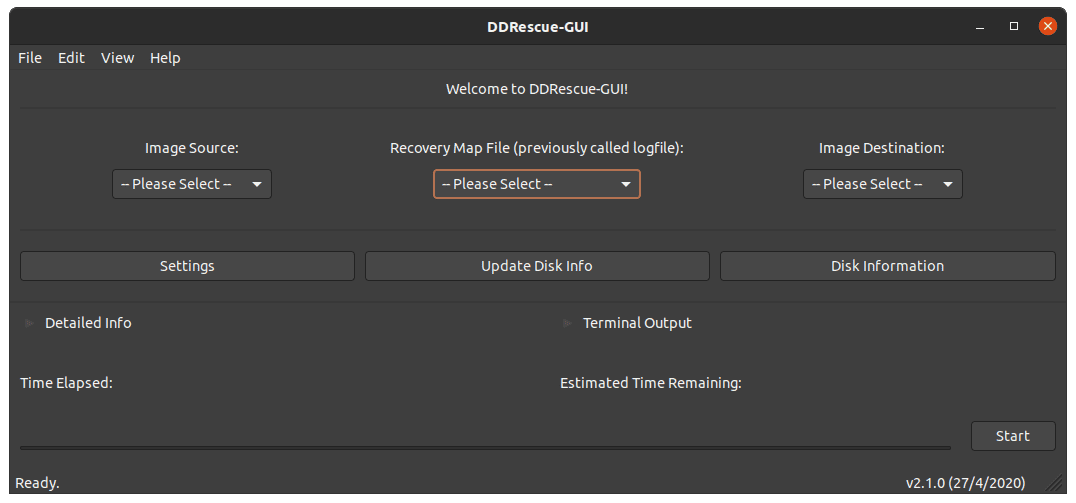
Ddrescue
Ddrescue is a free and open-source command-line utility distributed under the GNU license. Ddrescue is used in retrieving data when a read error occurs. You can download the Ddrecue setup file from the link below or use the Terminal commands.
Install Ddrescue on Ubuntu
sudo add-apt-repository ppa:hamishmb/myppa sudo apt update sudo apt-get install ddrescue-gui -y
Features
- Rescues data easily and fast by reading only the specified blocks.
- Enables users to stop/pause an ongoing activity and resuming at any time.
- Can recover necessary data efficiently in spit of disk errors and bad sectors.
- It highlights the bad sector on a drive.
- Ddrescues keeps track of logs about its advancement; therefore, reducing redundant scanning.
3. SafeCopy
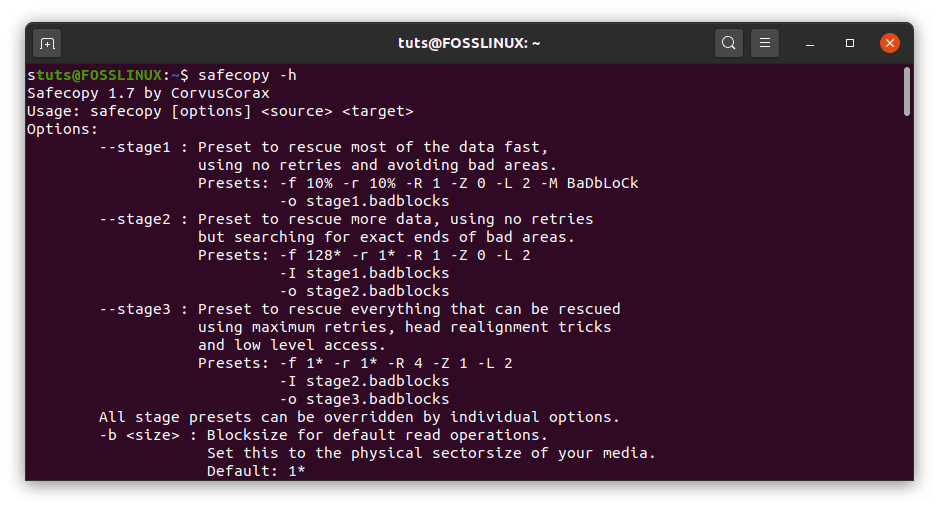
SafeCopy
It is one of the most reliable tools when all others fail. Written in C programming language, SafeCopy performs data recovery from bad sectors on a storage drive. You can download the SafeCopy setup file from the link below or use the command-line to install it.
Install SafeCopy on Ubuntu
sudo apt-get update sudo apt-get install -y safecopy
Features
- Since it’s written in C language, SafeCopy can execute low-level I/O operations.
- SafeCopy works in the background without slowing or bringing the computer to a deadlock.
- It’s available for use in 16 different languages.
- It can continue from the exact position of recovery in case a storage drive disconnects. (For example, a USB drive could disconnect either accidentally or due to faulty storage).
- SafeCopy can be used to fix errors in several storage media like DVD/CDs, Floppy drives, Hard drives, USB drives, etc.
4. Redo Backup and Recovery
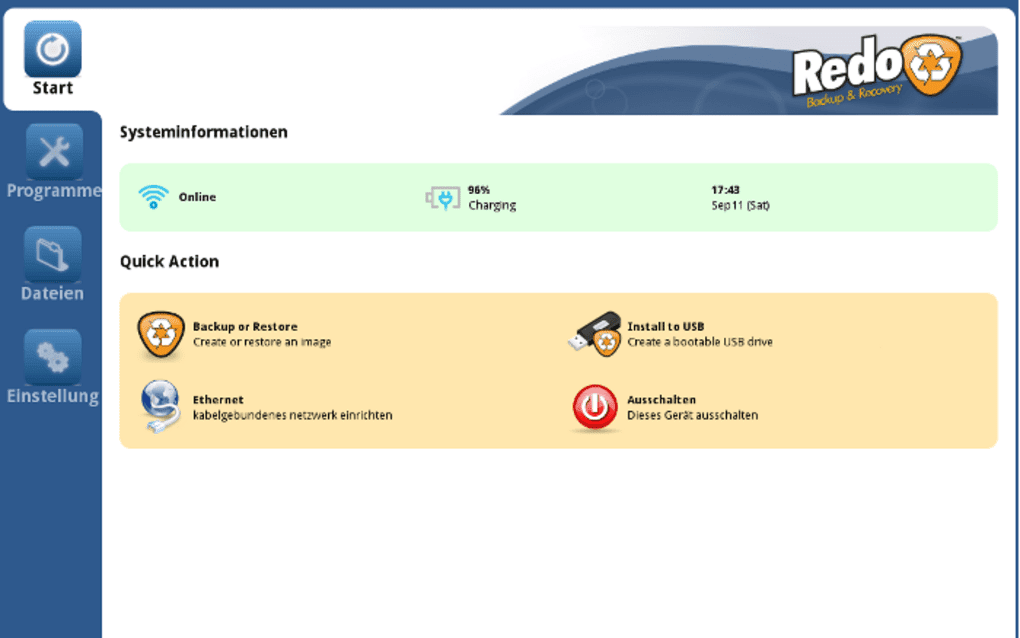
redo-backup-and-recovery
Redo Backup and Recovery is one of the available data recovery utilities with a Graphical User Interface (GUI) and released under the GNU GPL3. It is regarded as an easy-to-use tool even for newbies getting into Linux systems and have less knowledge about the Terminal commands.
Redo Backup and Recovery is available as an ISO file which can be used to create a bootable USB/CD to boot your PC. Since this tool is platform-independent, users can retrieve a lot more data from different partitions. Download Redo Backup and Recovery tool from the link below.
Download Redo Backup and Recovery
Features
- Redo Backup and recovery come with a few essential applications enabling you to carry out other tasks while recovering data. They include a text editor, browser, file manager, and Terminal.
- Available for use as a bootable USB/CD.
- It’s one of the few recovery utilities that make use of Partclone to clone disk partitions.
5. PhotoRec
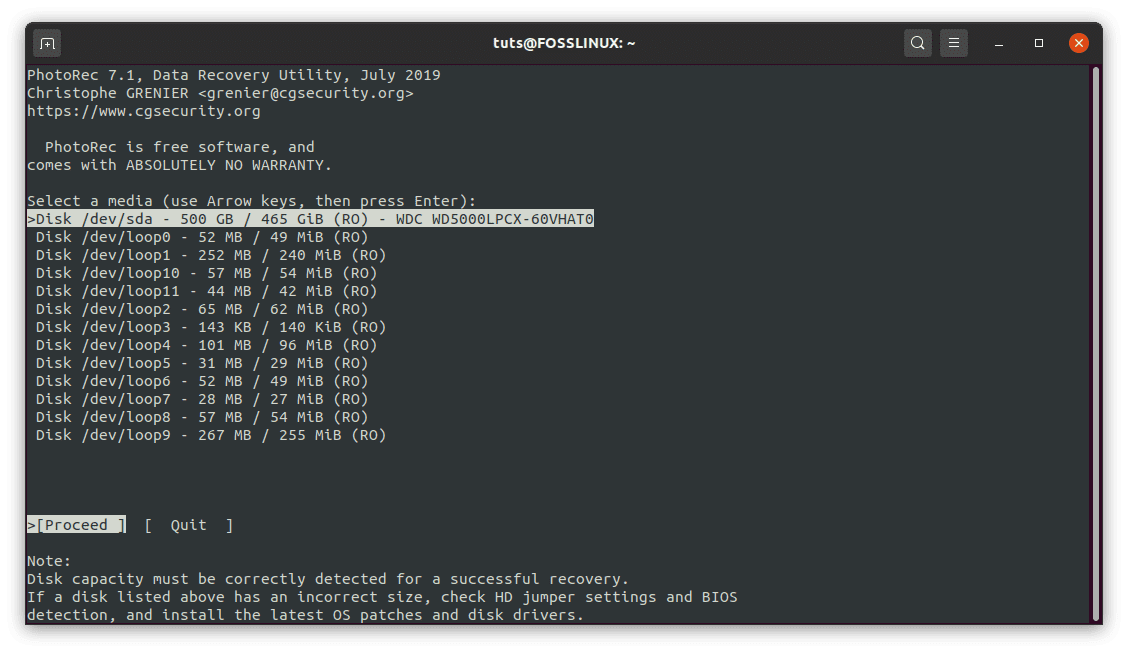
PhotoRec
PhotoRec is another amazing data recovery utility from CGsecurity. The other is TestDisk. PhotoRec was developed to accurately recover deleted images/photos and other graphic media files. It’s a free and open-source utility distributed under the GNU General Public Licence.
You can download the PhotoRec setup file from the link below or use the command-line install it.
Install PhotoRec on Ubuntu
PhotoRec comes along with the TestDisk Data Recovery utility. Therefore, to work with PhotoRec, we will install TestDisk.
sudo apt update sudo apt install testdisk
Launch Photorec with the command below.
sudo photorec
Features
- Comes with an intuitive and interactive interface
- PhotoRec supports a wide range of file formats
- Can recover damaged or lost photos from CD drives, Hard drives, and even digital cameras
- PhotoRec can discover unseen or unexplored data to recover photos even when the media storage is severely damaged.
6. Mondo Rescue
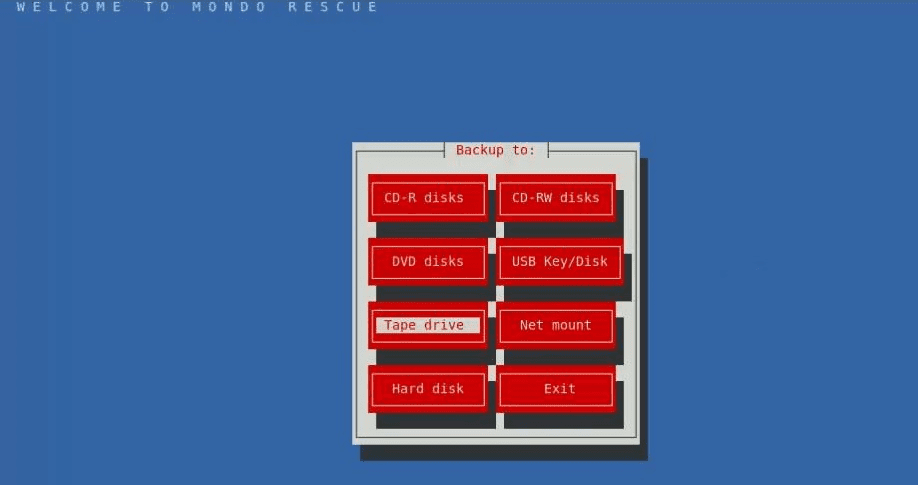
MondoRescue
Mondo is a free and highly reliable command-line data recovery utility available for most Linux distributions. It comes with several unique features and has been in the market for a long time used by large and tiny companies to recover/backup/restore data extensively. Mondo works with a wide range of storage media devices.
Features
- Used to verify the reliability of your system
- Can be used to perform several partition management features like resizing, formatting and partitioning
- It works with both RAID and Non-Raid devices
- Mondo is available for both Linux and Windows and can be used to recover the Master Boot Record (MBR).
- Can be used to verify the integrity of recovered data
Conclusion
I hope this article has given you enough information on the best Linux file recovery software available to download, and you can now make a choice on which tool best fits your needs. If you are a primary user, any of the tools above will be of great help. However, for advanced users with special needs on file recovery, they will need to go for one with the required features.
It’s important to note that most of the data recovery tools available, retrieve lost data using the metadata left in the drive. That is not a hundred percent guarantee you will recover every single byte of the data. At times, some of the files might be overwritten so much until the metadata itself is no longer useful. Therefore, it’s best always to have a backup of any critical data in your system.
Which tool do you use for data recovery in your Linux System? Feel free to share with our readers in the comment section below.

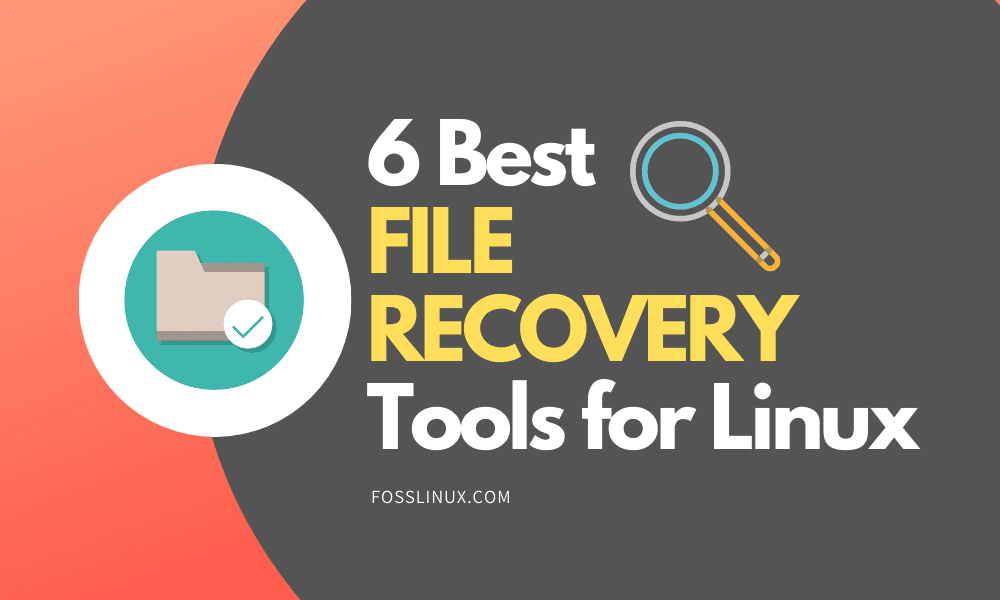
5 comments
Thank you for article. Can you please make article on file shredder or data eraser software for Fedora/Ubuntu?
“Redo Backup and Recovery is one of the available data recovery utilities with a Graphical User Interface (GUI) and released under the GNU GPL3. It is regarded as an easy-to-use tool even for newbies getting into Linux systems and have less knowledge about the Terminal commands.”
That’s a load of bullshit!
The site doesn’t even give a tutorial on how to install the damn thing. Funny how the Terminal alternative are easier than the GUI software. No support, impossible to know what to do unless you’re a linux geek.
Noob! Stick with windows you millennial crybaby snowflake. You want everything spoon fed to you. Redo Backup is very easy to use, it has a GUI for people like you.
Funny how you think replying with insults to a comment over eight months old is smart and witty when in fact the original person who commented is long gone and doesn’t care about the question anymore or your pitiful response.
I’m guessing by your insults your either one of three things a boomer, an x’er, or a zoomer. Well the first is undoubtedly the most entitled generation in history having unparalleled wealth and opportunities given to them by their parents only to amass it and keep it for themselves while sucking society dry, transferring jobs and manufacturing overseas, and leaving every generation afterward in a terrible economic plight. The x’ers got some of the wealth transfer effect of the boomers but not all of it and even though they tried their best to make good on their crumbling societies they sold out and became just as selfish and money-hungry as the boomers with less of the pie to go around. The zoomers are the most degenerate and dysfunctional generation so far with an astounding one quarter of all surveyed identifying with sexual degeneracy (traps and bisexuality.) When their faces aren’t glued to their screens or flashing people for money on webcams they are too busy eating tide pods and slinging condoms up their nasal passages. Some of this sexual and societal dysfunction was seen in gen Y but their numbers don’t even come close to the massive dysfunction of the zoomers.
@HA8841
WOW!
ok, fine, @EasyToUseRedo wasn’t quite fair to @Tournel Henry, agreed, but your rather long rant bashing EasyToUseRedo to almost the highest degree of destruction ever tried in history wasn’t quite fair either!
but and you didn’t just bash him/her … you DID everybody!
speaking so much about different generations and their issues and the problems some or all have caused for humanity are quite valid to some extent … (humanity? does that mean US: you, me and perhaps only a few others?)
only, i’m wondering to what generation you belong yourself: the NO IT DOESN’T WORK FOR ME UNLESS IT’S *FUNCTIONAL!* generation maybe baby?
(are you a dedicated synagogue or mosque or church goer of some kind perhaps? or one of those extremist atheists that are even more fanatic in their beliefs than the most rigidly minded religious sheeple out there? like typical commies of the 1930s and `40s, even those in the `60s and `70s and `80s who still hoped Stalin or Hitler and the like could have solved all human problems by slaughtering millions more of the goy if given a little more chance?)
PS: yes, your post is also rather old now … and maybe i shouldn’t have replied … but just as you did the same thing to someone else, then why not?! after all, just as i stumbled upon something worthy of spending a little time on, some others may like to the same too …